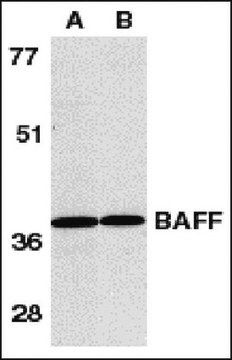ABE40
Anti-PABPC1/C3 Antibody
from rabbit, purified by affinity chromatography
Synonim(y):
Polyadenylate-binding protein 1, PABP-1, Poly(A)-binding protein 1
About This Item
Polecane produkty
pochodzenie biologiczne
rabbit
Poziom jakości
forma przeciwciała
affinity isolated antibody
rodzaj przeciwciała
primary antibodies
klon
polyclonal
oczyszczone przez
affinity chromatography
reaktywność gatunkowa
mouse, human
reaktywność gatunkowa (przewidywana na podstawie homologii)
canine (based on 100% sequence homology), bovine (based on 100% sequence homology), chicken (based on 100% sequence homology), rat (based on 100% sequence homology), Xenopus (based on 100% sequence homology)
metody
immunocytochemistry: suitable
western blot: suitable
numer dostępu NCBI
numer dostępu UniProt
Warunki transportu
wet ice
docelowa modyfikacja potranslacyjna
unmodified
informacje o genach
human ... PABPC1(26986)
Opis ogólny
Immunogen
Zastosowanie
Epigenetics & Nuclear Function
RNA Metabolism & Binding Proteins
Jakość
Western Blot Analysis: 1 µg/mL of this antibody detected PABPC1/C3 on 10 µg of HeLa cell lysate.
Opis wartości docelowych
Postać fizyczna
Przechowywanie i stabilność
Komentarz do analizy
HeLa cell lysate
Inne uwagi
Oświadczenie o zrzeczeniu się odpowiedzialności
Nie możesz znaleźć właściwego produktu?
Wypróbuj nasz Narzędzie selektora produktów.
Kod klasy składowania
12 - Non Combustible Liquids
Klasa zagrożenia wodnego (WGK)
WGK 1
Temperatura zapłonu (°F)
Not applicable
Temperatura zapłonu (°C)
Not applicable
Certyfikaty analizy (CoA)
Poszukaj Certyfikaty analizy (CoA), wpisując numer partii/serii produktów. Numery serii i partii można znaleźć na etykiecie produktu po słowach „seria” lub „partia”.
Masz już ten produkt?
Dokumenty związane z niedawno zakupionymi produktami zostały zamieszczone w Bibliotece dokumentów.
Nasz zespół naukowców ma doświadczenie we wszystkich obszarach badań, w tym w naukach przyrodniczych, materiałoznawstwie, syntezie chemicznej, chromatografii, analityce i wielu innych dziedzinach.
Skontaktuj się z zespołem ds. pomocy technicznej